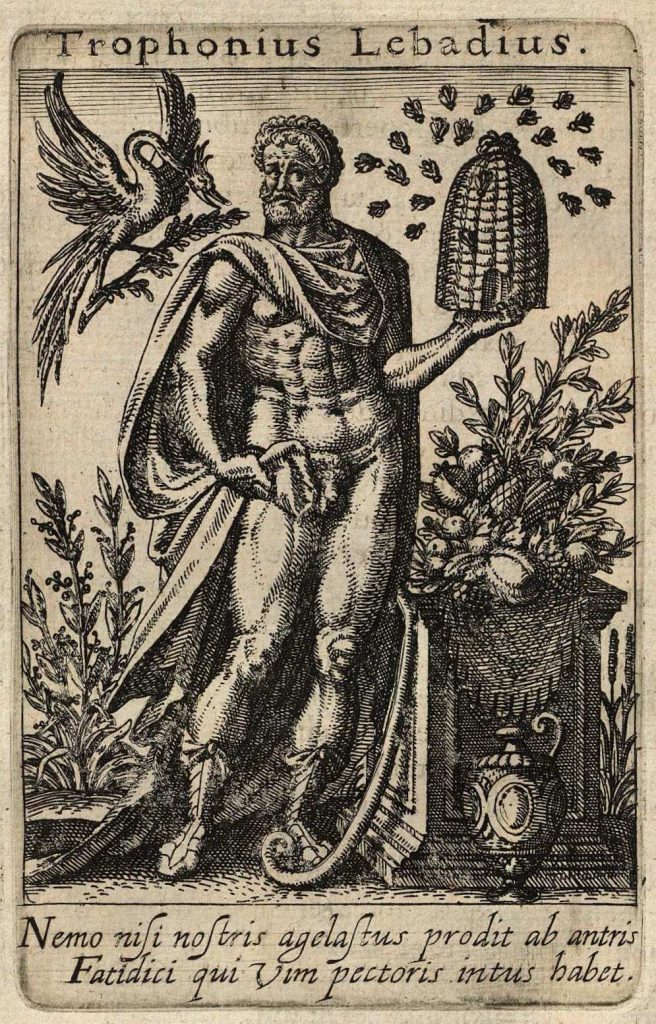
Trophonius, Historia Deorum Fatidicorum, Geneva 1675
Trophonius (the Latinate spelling) or Trophonios (Τροφώνιος) (in the transliterated Greek spelling) was a Greek hero or daimon or god it was never certain which one with a rich mythological tradition and an oracular cult at Levadia in Viotia.
Etymology and parallel cults
The name is etymologically derived from trepho, «to nourish». Strabo and several inscriptions refer to him as Zeus Trephonios. Several other chthonic Zeuses with similar titles are known from the Greek world, including Zeus Meilikhios («honeyed» or «kindly» Zeus), and Zeus Chthonios («Zeus beneath-the-earth»). Similar constructions are also found in the Roman world: for example, a shrine at Lavinium in Lazio was dedicated to Aeneas under the title Iuppiter Indiges (Jupiter in the earth).
Trophonius in myth
In Greek mythology, Trophonius was a son of Erginus. According to the Homeric Hymn to Apollo, he built Apollos temple at the oracle at Delphi with his brother, Agamedes. Once finished, the oracle told the brothers to do whatsoever they wished for six days and, on the seventh, their greatest wish would be granted. They did and were found dead on the seventh day. The saying «those whom the gods love die young» comes from this story.
Alternatively, according to Pausanias they built a treasure chamber (with secret entrance only they knew about) for King Hyprieus of Viotia. Using the secret entrance, they stole Hyprieus» fortune. He was aware but did not know who the thief was; he laid a snare. Agamedes was trapped in it; Trophonius cut off his head so that Hyprieus would not know who the body in the snare was. He then fled into the cavern at Levadia, and disappeared forever.
The cave of Trophonius was not discovered again until the Levadians suffered a plague, and consulted the Delphic Oracle. The Pythia advised them that an unnamed hero was angry at being neglected, and that they should find his grave and offer him worship forthwith. Several unsuccessful searches followed, and the plague continued unabated until a shepherd boy followed a trail of bees into a hole in the ground. Instead of honey, he found a daimon, and Levadia lost its plague while gaining a popular oracle.
The childless Xuthus in Euripides Ion consult Trophonius on his way to Delphi.
Apollonius of Tyana, a legendary wise man and seer of Late Antiquity, once visited the shrine and found that, when it came to philosophy, Trophonius was a proponent of sound Pythagorean doctrines.
Plutarch’s De Genio Socratis relates an elaborate dream-?vision concerning the cosmos and the afterlife that was supposedly received at Trophonius oracle.
Trophonius in cult
Pausanias, in his account of Viotia (9.39), relates many details about the cult of Trophonius. Whoever desired to consult the oracle would live in a designated house for a period of days, bathing in the river Herkyna and living on sacrificial meat. He would then sacrifice, by day, to a series of gods, including Kronos, Apollo, Zeus the king, Hera the Charioteer, and Demeter- Europa. At night, he would a black victim into a pit sacred to Agamedes, drink from two rivers called Lethe and Mnemosyne, and then descend into a cave. Here, most consultees were frightened out of their wits, and forgot the experience entirely upon coming up.Afterward, the consultee would be seated upon a chair of Mnemosyne, where the priests of the shrine would record his ravings and compose an oracle out of them.
Trophonius in the classical tradition
«To descend into the cave of Trophonios» became a proverbial way of saying «to suffer a great fright»: this saying is alluded to in Aristophanes Clouds. Several ancient philosophers, including Heraclides Ponticus, wrote commentaries on the cult of Trophonios that are now sadly lost.
Trophonios has been of interest to classical scholars because the rivers of Letheand Mnemosyne have close parallels with the Myth of Er at the end of Platos Republic, with a series of Orphic funerary inscriptions on gold leaves, and with several passages about Memory and forgetting in Hesiod’s Theogony.
Hercyna (gr. Herkyna) in Greek Mythology was a Naiad associated with the Herkyna river of Viotia.
Oracle of Trophonius at Lebadeia in Viotia (Paus. IX.37 §3). Those who wished to consult this oracle had first to purify themselves by spending some days in the sanctuary of the good spirit and good luck to live sober and pure, to abstain from warm baths, but to bathe in the river Hercyna, to offer sacrifices to Trophonius and his children, to Apollo, Cronos, king Zeus, Hera Heniocha, and to Demeter Europe, who was said to have nursed Trophonius and during these sacrifices a soothsayer explained from the intestines of the victims whether Trophonius would be pleased to admit the consultor. In the night in which the consultor was to be allowed to descend into the cave of Trophonius, he had to sacrifice a ram to Agamedes, and only in case the signs of the sacrifice were favourable, the hero was thought to be pleased to admit the person into his cave. What took place after this was as follows: Two boys, 13 years old, led him again to the river Hercyna, and bathed and anointed him. The priests then made him drink from the well of oblivion (Λήθη) that he might forget all his former thoughts, and from the well of recollection (Μνημοσύνη) that he might remember the visions which he was going to have. They then showed him a mysterious representation of Trophonius, made him worship it, and led him into the sanctuary, dressed in linen garments with girdles around his body, and wearing a peculiar kind of shoes which were customary at Lebadeia. Within the sanctuary which stood on an eminence, there was a cave, into which the person was now allowed to descend by means of a ladder. Close to the bottom, in the side of the cave, there was an opening into which he put his feet, whereupon the other parts of the body were likewise drawn into the opening by some invisible power. What the persons here saw was different at different times. They returned through the same opening by which they had entered, and the priests now placed them on the throne of Mnemosyne, asked them what they had seen, and led them back to the sanctuary of the good spirit and good luck. As soon as they had recovered from their fear, they were obliged to write down their vision on a little tablet which was dedicated in the temple. This is the account given by Pausanias, who had himself descended into the cave, and writes as an eye-witness (Paus. IX.39 §3, &c.; compare Philostr. Vit. Apoll. viii.19). The answers were probably given by the priests according to the report of what persons had seen in the cave. This oracle was held in very great esteem, and did not become extinct until a very late period: and though the army of Sulla had plundered the temple, the oracle was much consulted by the Romans (Orig. c. Cels. vii p355), and in the time of Plutarch it was the only one among the numerous Viotian oracles, that had not become silent (Plut. de Orac. Def. c5).
At Livadia they remained the greater part of three days, during which they examined with more than ordinary minuteness the cave of Trophonius, and the streams of the Hercyna, composed of the mingled waters of the two fountains of Oblivion and Memory. Lord Byron in Greece.






